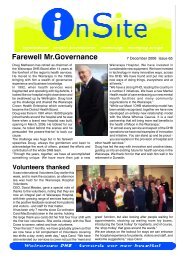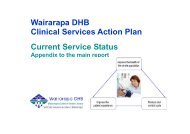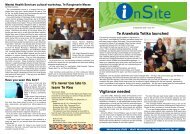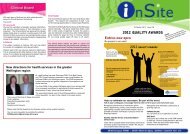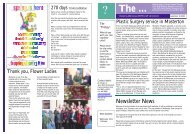Te Arawhata Totika - Wairarapa DHB
Te Arawhata Totika - Wairarapa DHB
Te Arawhata Totika - Wairarapa DHB
You also want an ePaper? Increase the reach of your titles
YUMPU automatically turns print PDFs into web optimized ePapers that Google loves.
<strong>Te</strong> kAuwAe ruNGA <strong>Te</strong> kAuwAe rArO<br />
Explains the combining of indigenous knowledge with knowledge drawn from other cultures<br />
Establishing a relationship with local Iwi<br />
The Decade of Mäori Development<br />
1980–1990<br />
During the period known as the Decade of Mäori<br />
Development (1980–1990) a number of initiatives<br />
focusing upon hauora were developed and<br />
implemented. These were associated with the<br />
then Area health Boards.<br />
in particular the wanganui Area health Board, the<br />
Taranaki Area health Board became the leaders<br />
in this area and developed specific relationships<br />
with local iwi and provided health services that met<br />
the expressed need of Mäori. Other Area health<br />
Boards followed; Ngäti whatua and waipareira<br />
Trust, (Auckland) Ngäti kahungunu, (Taiwhenua o<br />
heretaunga) hawkes Bay, to cite a few. Over this<br />
period the numbers of Mäori providers increased<br />
dramatically from a mere twenty to over 200.<br />
Ngäti Kahungunu Ki <strong>Wairarapa</strong><br />
involvement in hauora was always part of the history<br />
of Ngäti kahungunu ki wairarapa and is part of<br />
the history of wairarapa iwi. As an outcome of the<br />
Papawai hui a whänau in 1996 it was negotiated<br />
by the then Taiwhenua of Ngäti kahungunu ki<br />
wairarapa that the establishment and development<br />
of community based health services be organised<br />
under the umbrella of this organisation. Services<br />
provided included whänau health, kaumätua health,<br />
nutrition and physical activity and health promotion.<br />
This organisation, named by kaumätua, became<br />
known as whäiora whänui and in 2000 develop ed<br />
into an independent health service provider.<br />
Rangitäne O <strong>Wairarapa</strong><br />
As one of the mandated iwi authority of the area,<br />
rangitäne have an obligation to ensure that<br />
the health of their people is maintained. The<br />
organisational arm known as rangitäne O<br />
wairarapa iwi incorporated provide a range of<br />
services including whakapapa, kaumätua support,<br />
cultural services, social and health services,<br />
and environmental advice and research.<br />
<strong>Te</strong> Hauora Runanga O <strong>Wairarapa</strong><br />
<strong>Te</strong> hauora runanga o wairarapa was establish ed<br />
in the early nineties. Funding came directly<br />
from the Ministry of health and was extremely<br />
minimal. The growth of hauora since it was first<br />
conceived has been impressive in that they have<br />
established themselves in the community as an<br />
essential provider of whänau ora services. They<br />
have become a diverse provider of kaupapa<br />
Mäori service provision and continue to provide<br />
a range of quality health services to wairarapa<br />
com munity maintaining the philosophy of whänau<br />
ora as the model that underpins all its future<br />
developments. hauora has received accreditation<br />
across three health standards: health and disability,<br />
alcohol and drug, and mental health. They have<br />
increased the number of staff and contractual<br />
services provided to the people of wairarapa and<br />
have embedded themselves in the community<br />
as a quality kaupapa Mäori service provider.<br />
Whäiora Whänui Inc.<br />
in 1996 at a hui a whänau at Papawai Marae the<br />
people conveyed to the facilitators that there was<br />
a need for a community based health service to<br />
serve Mäori throughout the wairarapa district. A<br />
small group developed a proposal for a service that<br />
focused upon the health and wellbeing of whänau.<br />
initially it was thought that this service would have<br />
a base in both the North and South wairarapa.<br />
The decision was made to develop health services<br />
within Ngäti kahungunu Taiwhenua o wairarapa.<br />
This health service became known as whäiora<br />
whänui and was based in Masterton but served<br />
the whole of the wairarapa. in May 1997 whäiora<br />
whänui went live with 1.5 health professionals and a<br />
limited amount of clerical support. whäiora whänui,<br />
became a reality and in January 2000 it became<br />
a separate organisational entity with a growing<br />
number of Ministry of health contracts. rangitäne o<br />
wairarapa pioneered the Family Start programme<br />
that since 2005 now sits with whäiora.<br />
<strong>Te</strong> <strong>Arawhata</strong> Tötika Cultural Competency Framework<br />
15



